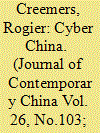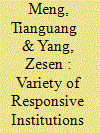| Srl | Item |
| 1 |
ID:
151415


|
|
|
|
|
| Summary/Abstract |
The first two years of the Xi Jinping administration saw a thorough reconfiguration of Internet governance. This reconfiguration created a centralized and integrated institutional framework for information technologies, in support of an ambitious agenda to place digital technologies at the heart of propaganda, public opinion and social control work. Conversely, the autonomy and spontaneity of China’s online sphere was vastly reduced, as the leadership closed channels for public deliberation. This article reviews the institutional and regulatory changes that have taken place between 2012 and 2014, and analyses the methods and purposes of control they imply.
|
|
|
|
|
|
|
|
|
|
|
|
|
|
|
|
| 2 |
ID:
174398


|
|
|
|
|
| Summary/Abstract |
The widespread use of the ICTs (information and communication technologies) has reshaped the state-society relations and is driving the diffusion of digital responsiveness, which is serving as a channel to link public opinions and policymaking. A growing body of literature focuses on how the Chinese government responds to the public in cyberspace. However, how responsive institutions are shaping the quality of responsiveness is underdiscussed. We explore a variety of responsive institutions in subnational China and examine their effect on response quality through automated text analyses to massive citizen-government interactive records. There exist six parallel typologies of responsive institutions, including party office, government office, inclusive agency, functional agency, supervision agency, and petition office. Compared with the others, party and government office, professional functional agencies are more likely to stimulate the improvement of response quality. Agencies with limited political authority often fail to make a highquality response. The degree of institutionalization does not improve response quality but facilitates response timeliness. Local leaders' demonstration behavior, however, counteractively has a positive effect on response quality.
|
|
|
|
|
|
|
|
|
|
|
|
|
|
|
|